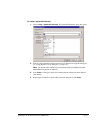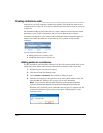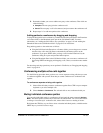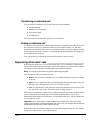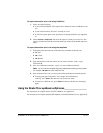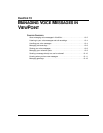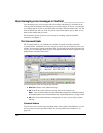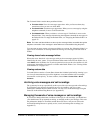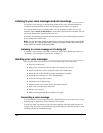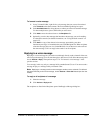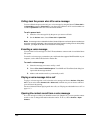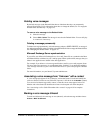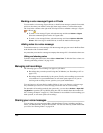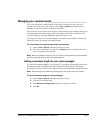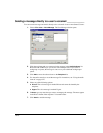
CHAPTER 13. MANAGING VOICE MESSAGES IN VIEWPOINT 13-3
The Voicemail folder contains three predefined folders:
Q The Inbox folder. New voice messages appear here. After you listen to them, they
remain here unless you move or delete them.
Q The Saved folder. Saved messages appear here. When you save a message by using the
telephone commands, it moves to the Saved folder.
Q The Deleted folder. When you delete a voice message in ViewPoint, it moves to the
Deleted folder. Voice messages deleted using the telephone commands do not appear in
the Deleted folder. To empty the Deleted folder, see
“Emptying the Deleted folder” on
page 8-23.
Note: The Inbox and Saved folders are the only voice message folders accessible through the
telephone commands. Voice messages in other folders are not accessible using the phone.
You can create as many custom voice message folders as you want. See “Managing folders” on
page 8-22 for instructions on creating folders and moving voice messages from one folder to
another.
Viewing shared voice message folders
When other users share their voice messages with you, those messages appear in folders
identified by the users’ names. You can find those folders under in the Favorite Folders list, or
under
Public in the All Folders list. If you have permission to access the voice mailbox of a call
center queue, that mailbox also appears as a folder under Public Folders. See “Viewing folders
in the Folder List” on page 8-22.
Viewing custom data
Voicemail folders contains a Custom Data column that is hidden by default. By showing it you
can view all custom data that your office might have associated with the call, for example,
customer ID or caller priority. To show columns, choose
View > Current View > Show
Columns
.
Archiving voice messages and call recordings
The system may be set up to periodically archive your older voice messages and call recordings.
If you find that your messages disappear from your voice mailbox, ask your system
administrator whether they have been archived. You can access archived messages using the
Strata CS Archived Recording Browser (see Appendix E).
Managing thousands of voice messages or call recordings
If you need to manage thousands or millions of messages or call recordings, you should have
your administrator set up automatic archiving, or manually archive your messages. This eases
the performance burden on ViewPoint and the Strata CS Server, and you can still use the
Archived Recording Browser to quickly review, search, and manage the recordings (see
Appendix E).



